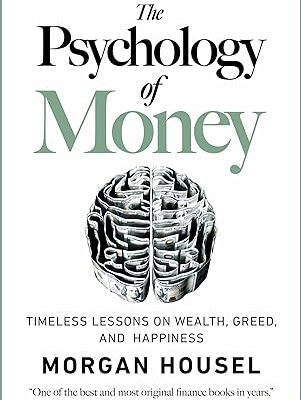The Algebra of Wealth: A Simple Formula for Financial Security
The overarching formula that Scott Galloway puts forth in The Algebra of Wealth is groomed for a gradual accumulation of wealth, rather than some get-rich-quick scheme. His approach is to champion the ‘Algebra of Wealth’ through four concepts: focus, stoicism, time, and diversification. Author:Scott Galloway, Scott Galloway(Narrator) Publisher:Penguin Audio, Penguin Audio
It speaks to those who already have their financial house in order and are looking to go the next mile; Galloway pulls details about how your people will evaluate your performance from the business world, giving straightforward advice that appeals to the brain reader in the ‘Focus’ section: hone your work ethic. Specificity is more important than being a generalist – distill yourself into a domain and master it.
The section on Stoicism emphasizes the power of a mentally strong psyche and stresses the merits of not spending everything you make, living beneath your means, and eschewing lifestyle inflation. This is a welcome corrective for a world awash in debt and gratification in the absence of need.
If you would like to get a free audiobook, continue here…
The key to the ‘formula’, such as it is, is ‘time’ It isn’t just the spectacular returns that seem exaggerated: the way Galloway diverges from Bogle (‘consistently investing over the long haul is far more effective than savvy stock-picking or “hot” investments’) is equally dumbfounding. Tom Wolfe couldn’t dream up a better non-formula for making money in the markets: ‘Time is your friend, not your enemy. Compound interest means you make money on your money, which means it’s not just the amount you invest, it’s what’s called “money that’s earned on money”… The reason you’re going to succeed at building a fortune is NOT because you have an Ivy League education because you have some secret technique for picking stocks or because you’ll always know when the market is hot or when to get out and when to get back in.’ Galloway (who does have an Ivy League MBA) harps on the magic of compound interest, packing his introduction with exhortations for young people to start contributing money to their 401(k) immediately and to direct as much money as possible into their retirement savings. Galloway is on to something important here: a long time horizon is the fundamental building block of smart financial planning. Honestly, much of Galloway’s first chapter (‘Get Rich Now, Even if You Don’t Have Money Invested Yet (or Much) and Certainly No Smart Education’) would work as well if the word ‘now’ is substituted for ‘2005’. Now, why does this otherwise fresh formula seem so stale?
The third half of the equation is ‘diversification’. Galloway advises not to ‘put all your eggs’ in any one basket and encourages their clients to maintain a diversified portfolio across asset classes to ‘protect investments from downturns and booms’.
If you would like to get a free audiobook, continue here…
The message of the book is solid, but because he’s a businessman and the audience is primarily young jobseekers, I’m sure many will find the career tips inconsistent with their desires. The ‘Stoicism’ section might just be preachy enough to turn off some of the already converted mindful consumers.
A second possible drawback is what it doesn’t cover: specific investment advice. Galloway provides a framework for how to build wealth, but not the finer details of how to structure your portfolio or how to find individual investments. Readers looking for a more detailed roadmap of how to invest may have to look elsewhere.
In summary, The Algebra of Wealth is a good read for anyone seeking to gain a fresh.









